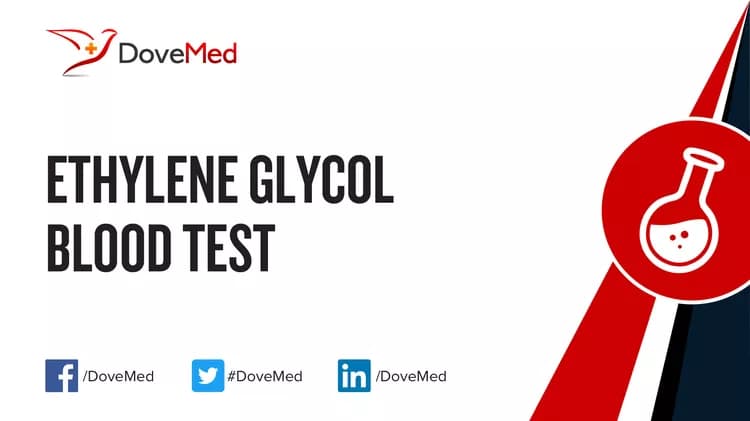What are other Names for this Test? (Equivalent Terms)
- 1,2-Ethanediol Blood Test
What is the Ethylene Glycol Blood Test? (Background Information)
- Ethylene glycol is a compound found in antifreeze, coolants, deicers, brake fluids, detergents, paints, and inks. It is colorless, odorless, and sweet-tasting. The industrial uses of ethylene glycol stem from its ability to increase the boiling point and decrease the freezing point of mixtures
- The sweet taste of ethylene glycol results in animals and infants being attracted to it and consuming it. However, it is a toxic chemical compound. The symptoms of toxicity appear, if more than 250 mg/L is ingested, and 100 mL is enough to kill an adult
- Ethylene glycol levels peak within 1-4 hours after consumption. It normally takes 3-6 hours to be excreted via urine, if the kidneys are not damaged by the toxicity caused by ethylene glycol. Its toxicity is marked by psychological effects, such as altered mental status, and difficulty breathing
- Ethylene glycol may be countered immediately by consuming grain alcohol, which outcompetes some of the ethylene glycol in the body and interferes with its toxic effects. This is because ethylene glycol is broken down by some of the same enzymes that break down grain alcohol namely, alcohol dehydrogenase (ADH)
- In fact, the breakdown products of ethylene glycol are responsible for its toxic effects. These products include glycolic acid (GA), which acidifies blood and contributes to toxicity
- Some GA is converted to oxalic acid, which may react with nearby calcium to crystallize in the blood and tissues. Oxalic acid crystals are responsible for the majority of kidney stones. This process also uses up the calcium in blood, which may cause hypocalcemia
- The Ethylene Glycol Blood Test helps determine the levels of ethylene glycol in blood. It is used to diagnose ethylene glycol toxicity
What are the Clinical Indications for performing the Ethylene Glycol Blood Test?
Following are the clinical indications for performing the Ethylene Glycol Blood Test:
- Altered mental status
- Difficulty breathing
- Nausea
- Vomiting
- Coma
- Convulsions
- Stupor
How is the Specimen Collected for the Ethylene Glycol Blood Test?
Following is the specimen collection process for Ethylene Glycol Blood Test:
Sample required: Blood
Process of obtaining blood sample in adults:
- A band is wrapped around the arm, 3-4 inches above the collection site (superficial vein that lies within the elbow pit)
- The site is cleaned with 70% alcohol in an outward spiral, away from the zone of needle insertion
- The needle cap is removed and is held in line with the vein, pulling the skin tight
- With a small and quick thrust, the vein is penetrated using the needle
- The required amount of blood sample is collected by pulling the plunger of the syringe out slowly
- The wrap band is removed, gauze is placed on the collection site, and the needle is removed
- The blood is immediately transferred into the blood container, which has the appropriate preservative/clot activator/anti-coagulant
- The syringe and the needle are disposed into the appropriate “sharp container” for safe and hygienic disposal
Preparation required: No special preparation is needed prior to the test.
What is the Significance of the Ethylene Glycol Blood Test Result?
A high value (greater than 250 mg/L) for the Ethylene Glycol Blood Test may indicate ethylene glycol toxicity, which is marked by:
- Altered mental status
- Difficulty breathing
- Nausea
- Vomiting
- Coma
- Convulsions
- Stupor
The laboratory test results are NOT to be interpreted as results of a "stand-alone" test. The test results have to be interpreted after correlating with suitable clinical findings and additional supplemental tests/information. Your healthcare providers will explain the meaning of your tests results, based on the overall clinical scenario.
Additional and Relevant Useful Information:
- The most common causes of ethylene glycol consumption include accidental ingestion by infants and animals, and mixing up of drinking containers in the workplace. It is also used to attempt suicide
Certain medications that you may be currently taking may influence the outcome of the test. Hence, it is important to inform your healthcare provider of the complete list of medications (including any herbal supplements) you are currently taking. This will help the healthcare provider interpret your test results more accurately and avoid unnecessary chances of a misdiagnosis.
The following DoveMed website link is a useful resource for additional information:
http://www.dovemed.com/common-procedures/procedures-laboratory/anion-gap-blood-test/
Please visit our Laboratory Procedures Center for more physician-approved health information:
http://www.dovemed.com/common-procedures/procedures-laboratory/
Related Articles
Test Your Knowledge
Asked by users
Related Centers
Related Specialties
Related Physicians
Related Procedures
Related Resources
Join DoveHubs
and connect with fellow professionals


0 Comments
Please log in to post a comment.